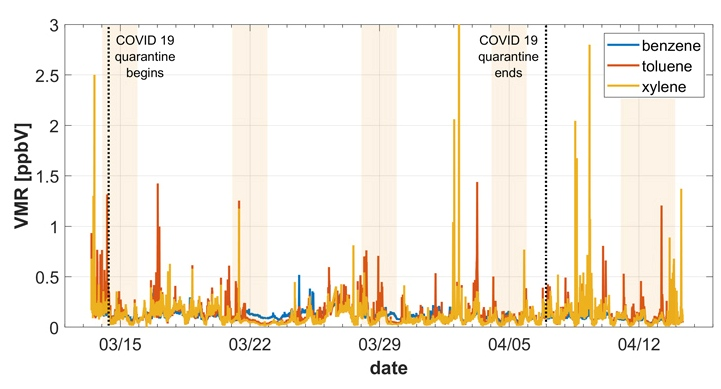Facing an impending shutdown due to the COVID 19 crisis, we started to document its impact on the environment by analyzing Innsbruck’s air quality with a CHARON PTR-TOF 6000 X2. And indeed, the entire Tyrol was quarantined on March 14th, 11am. This had clear effects on traffic and personal mobility. Very recently, Google Inc. has reported a reduction of the mobility in the Tyrol between 65% and 95% associated to workplaces and to retail & recreation, respectively. The associated reduction of anthropogenic emissions in Innsbruck has also been observed by our colleagues at the University of Innsbruck. They faced a clear reduction of NOx concentrations in downtown Innsbruck and found a NO to NO2 ratio that can be associated with “clean” conditions.

IONICON, on the other hand, is situated in the industrial outskirts of Innsbruck in the proximity of one of the most frequented highways in Austria that connects Germany and Italy. Therefore we were not expecting too much of a change. When we look at our VOC measurements, we do see a drop of the concentrations of benzene, toluene and xylene right after the quarantine measures were announced. These VOCs can be typically associated with combustion processes like traffic. Especially on Sundays the reduction gets really obvious. Benzene volume mixing ratios remain stable, but relatively short lived toluene and xylene concentrations drop to near zero values. This indicates a highly reduced emission of combustion related VOCs.
We also measured the organic fraction of sub-µm atmospheric particles with our CHARON particle inlet. At this time of the year, particles are still dominated by biomass-burning organic aerosol (BBOA) mostly emitted by residential heating. Levoglucosan is the dominant tracer compound of BBOA (up to 20%). PAHs like pyrene and fluoranthene are also known to be emitted by biomass burning processes, but have an additional source by traffic emissions. In the last few weeks, the PAHs show a rather good correlation with levoglucosan. In addition, the PAH time series lacks almost all typical morning hour rush hour spikes.
In the meantime, after Easter, the Austrian government has decided to ease the lockdown somewhat and Tyrol is no longer under quarantine. In our measurements we have seen rising BTX levels. The organic particle fraction does correlate but stays below earlier maximum levels, likely because of extremely mild temperatures in April and therefore assumed reduced biomass burning impact.
CHARON PTR-TOF allows to analyze and monitor almost the full range of atmospheric organic carbon with one single IONICON instrument.